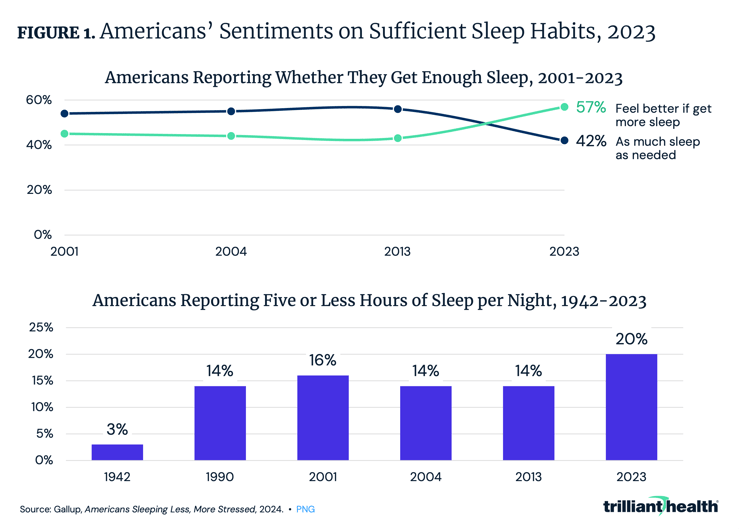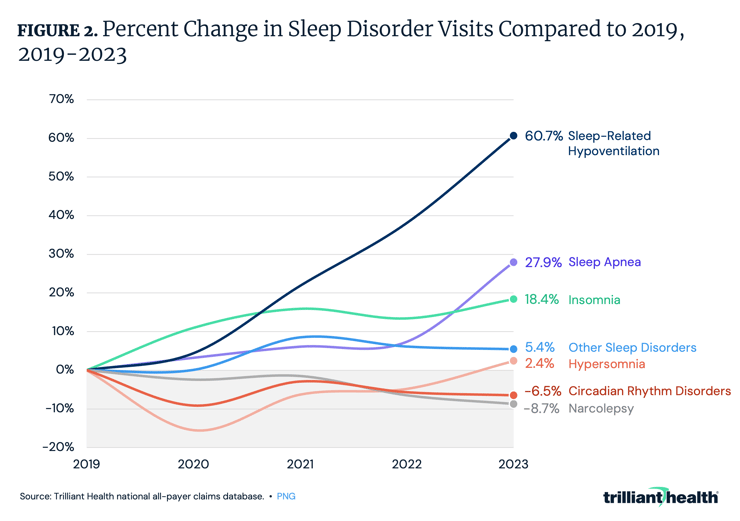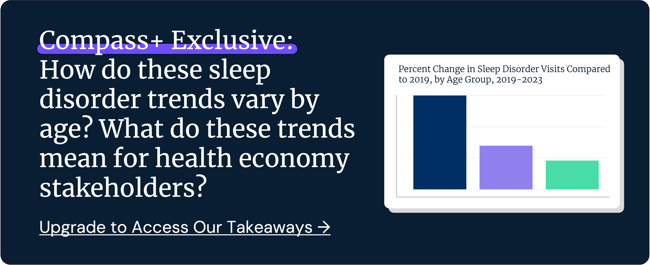The Compass
Sanjula Jain, Ph.D. | August 4, 2024Sentiments Regarding Insufficient Sleep Are Reflected in an Increase in Sleep Disorders
You are currently viewing the public version of Studies. To unlock the full study and additional resources, upgrade your subscription to Compass+.
Recent research indicates that Americans are collectively experiencing the psychological impacts in the aftermath of macro events of the past five years, including pandemic-era lockdowns, economic uncertainty and global conflicts, manifesting in the deteriorating mental health status of the country.1 Sleep is a critical component in overall health status, notably for cognitive functioning, stress management, mood, mental health and physical health (e.g., cardiovascular, cerebrovascular and metabolic health).2 Chronic insufficient sleep is associated with an increased risk of mortality and chronic conditions (i.e., cardiovascular disease, diabetes, obesity and cancer).3 Given the implications for health status and mortality, we were interested in examining trends in sleep disorders.
Background
While the recommended amount of sleep varies by age, the American Academy of Sleep Medicine and the Sleep Research Society recommend seven or more hours of sleep per night for the average adult to maintain optimal health.4 The field of sleep medicine is less mature relative to other areas of medicine but has been the focus of rapid development since the middle of the 20th century. In the 1980s, circadian sleep-wake disorders received recognition as their own category of disorders and the origins of sleep medicine fellowships were established.5 As of 2024, there are 213 sleep medicine fellowship positions offered nationally among 102 programs, with an 88.3% fill rate.6
Surveys conducted over decades have revealed that Americans are generally more stressed and sleeping less than ever before.7 A majority of U.S. adults (57%) reported in 2023 that they would feel better if they got more sleep, an increase of 12 percentage points from 2001 (Figure 1). Additionally, while just 3% of Americans got five or fewer hours of sleep per night in 1942, this share increased to 20% by 2023.
With worsening sleep habits and higher stress levels in a health economy with a limited supply of sleep specialists, it is important to understand the prevalence of sleep disorders and demand for related care in the U.S.
Analytic Approach
We leveraged our national all-payer claims database to analyze utilization of health services attributed to select sleep disorders between 2019 and 2023. We examined patients in aggregate, and for ages 18-44, 45-65 and over age 65.
Findings
Trends in sleep disorders by condition reveal meaningfully different levels of change over the last four years. Visits for sleep apnea comprised the highest volume of care utilization and increased 27.9% from 2019 to 2023, while sleep-related hypoventilation – abnormally slow or shallow breathing during sleep, leading to insufficient oxygen intake and increased levels of carbon dioxide in the blood – increased 60.7% during the same time period. In contrast, visits related to narcolepsy (-8.7%) and circadian rhythm disorders (-6.5%) declined (Figure 2).
Thanks to Colin Macon and Katie Patton for their research support.
- Specialty Care
- Behavioral Health
- Healthcare Workforce
- Disease Burden
You are currently viewing a free preview of our premium studies. To receive new studies weekly, upgrade to Compass+ Professional.
Sign UpSee more with Compass+
You are currently viewing the free version of this study. To access the full study, subscribe to Compass+ Professional for $199 per year.
Sign Up for Compass+
